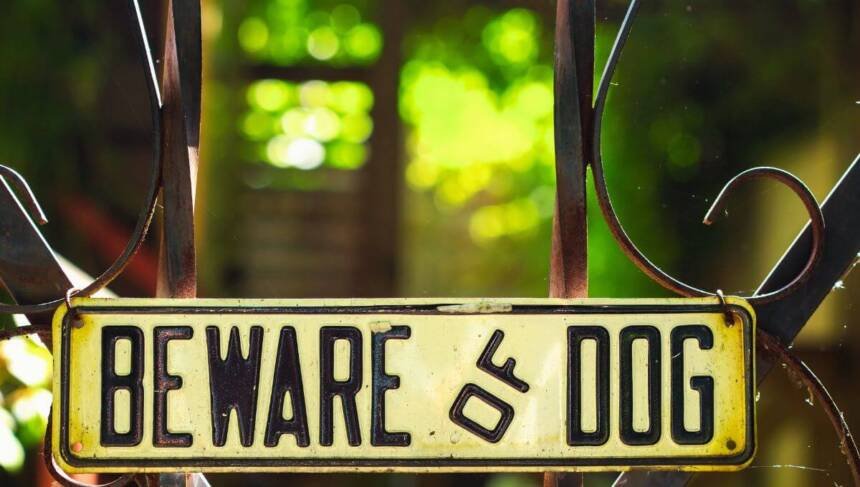When a dog hits someone, it can hurt them physically, emotionally, and financially. Because of how often and badly these things happen, many states have passed strict liability dog bite rules.
The goal of these rules is to make dog owners responsible for their pets’ actions, even if the owner knows about the dog’s bad behavior. People who were hurt don’t have to show that the dog was mean in the past or that the owner was careless in states with strict liability rules.
This article looks at the states that have these kinds of rules and what they mean for dog owners and people who have been bitten by dogs.
Understanding Strict Liability in Dog Bite Cases
Strict liability laws for dog bites simplify the legal process for victims. Under these laws, a dog owner is automatically held responsible if their dog bites someone, with few exceptions.
This contrasts with the “one-bite rule,” where an owner is only liable if they knew or should have known about the dog’s propensity for aggression based on past behavior.
Key States with Strict Liability Dog Bite Laws
California

California’s dog bite statute, Civil Code Section 3342, imposes strict liability on dog owners. The law states that the owner of any dog is liable for damages if the dog bites someone in a public place or lawfully in a private place, including the owner’s property.
This applies regardless of the dog’s past behavior or the owner’s knowledge of its potential for aggression. Exceptions exist if the victim was trespassing or provoking the dog.
Florida

Florida’s strict liability statute is found in Florida Statutes Section 767.04. It holds dog owners liable for any damages caused by their dogs if a bite occurs in a public place or when the victim is lawfully on private property.
This law also includes provisions to reduce liability if the owner prominently displays a “Bad Dog” sign and the victim is six years of age or older.
Michigan

Michigan’s dog bite law, Michigan Compiled Laws Section 287.351, states that the owner of a dog is liable for any damages suffered by a person bitten by the dog while on public property or lawfully on private property.
The law applies regardless of the dog’s past behavior or the owner’s knowledge of its viciousness.
New Jersey

New Jersey’s dog bite statute, found in New Jersey Statutes Annotated Section 4:19-16, imposes strict liability on dog owners for bites occurring in public places or when the victim is lawfully on private property.
The owner’s liability is not dependent on the dog’s previous behavior or the owner’s awareness of any aggressive tendencies.
Arizona

Arizona’s strict liability law is codified in Arizona Revised Statutes Section 11-1025. This statute holds dog owners liable for any injuries their dogs cause if the bite occurs in a public place or when the victim is lawfully on private property.
The law applies irrespective of the dog’s history or the owner’s knowledge of its aggressive behavior.
Ohio

Ohio’s dog bite statute, Ohio Revised Code Section 955.28, imposes strict liability on dog owners for injuries caused by their dogs. This law holds the owner responsible if the bite occurs in a public place or when the victim is lawfully on private property.
Ohio law provides exceptions for situations where the victim was trespassing or committing another criminal offense on the owner’s property.
Illinois

Illinois law, under 510 Illinois Compiled Statutes 5/16, states that the owner of a dog is liable for injuries caused by their dog if the bite occurs without provocation and the victim is peaceably conducting themselves in a place where they have a legal right to be.
The law imposes strict liability regardless of the dog’s past behavior or the owner’s knowledge of its tendencies.
Implications for Dog Owners and Victims
Strict liability dog bite laws place a significant burden on dog owners to ensure their pets are well-behaved and properly contained.
Owners in these states must take proactive measures to prevent their dogs from biting, such as using leashes, secure fencing, and training.
Failure to do so can result in substantial financial liability, including medical expenses, lost wages, and pain and suffering for the victim.
For victims, strict liability laws provide a more straightforward path to compensation. They do not need to prove that the owner was negligent or that the dog had a history of aggression.
This can lead to quicker and more certain recovery of damages, providing essential support for medical treatment and other expenses related to the bite.
The Bottom Line
Strict liability dog bite laws represent a clear and stringent approach to managing the risks associated with dog ownership.
By holding owners accountable regardless of their knowledge or the dog’s past behavior, these laws aim to enhance public safety and ensure victims receive appropriate compensation.
As more states consider adopting similar statutes, the emphasis on responsible pet ownership and prevention of dog bite incidents is likely to grow, ultimately benefiting communities as a whole.



